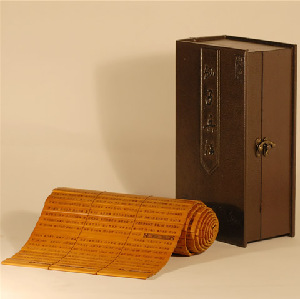
Sun Zi Bing Fa
, also known as
Sun Tzu Art of War, was written by the famous strategist Sun Wu, a native of today's Zhongmin County in East China's
Shandong Province, during the late
Spring and Autumn Period(770-476BC).
Sun Zi Art of Waris the world's earliest military book extant in China and militarists all over the world have paid much attention to the book (which has been translated into several languages) from its very beginning. At the beginning of theTang Dynasty(618-907), it was introduced into Japan. After the Song Dynasty (960-1279), it was listed as the first book of the Seven Military Classics. The book was introduced into Europe and America in modern times. It is said that after Napoleon was defeated in war, he regretted that he had not earlier read this book.
In April 1972, bamboo slips versions ofSun Zi Bing FaandSun Bin Bing Fawere discovered in the No.1 Tomb of theHan Dynasty(206BC-220AD) in the Yinyue Mountain in Linyi of East China's Shandong Province.
The book features very terse language and philosophic contents, as can bee seen from below.
At the very beginning of the book, it makes clear that "the art of war is of vital importance to the state. It is a matter of life and death, a road either to safety or to ruin. Hence under no circumstances can it be neglected." Therefore, says the book, the commanders of a war should carefully compare the conditions of the two parties, and "make calculations before the war to win it." The book suggests that generals should spare no money in using spies to fully learn the states of the enemy and stresses that preparedness is essential for war.
Sun Zi advocates maximizing the victory with minimum cost, via his famous all-round victory theory of "subduing the enemy troops without any fighting." The essence of the theory is to attain one's purposes through a series of unmilitary measures like tactics and diplomacy, based of course on military strength. The all-round victory thought constituted an important part in traditional Chinese strategic culture, and became the ideal goal for later militarists to diligently pursue, up to this very day.
